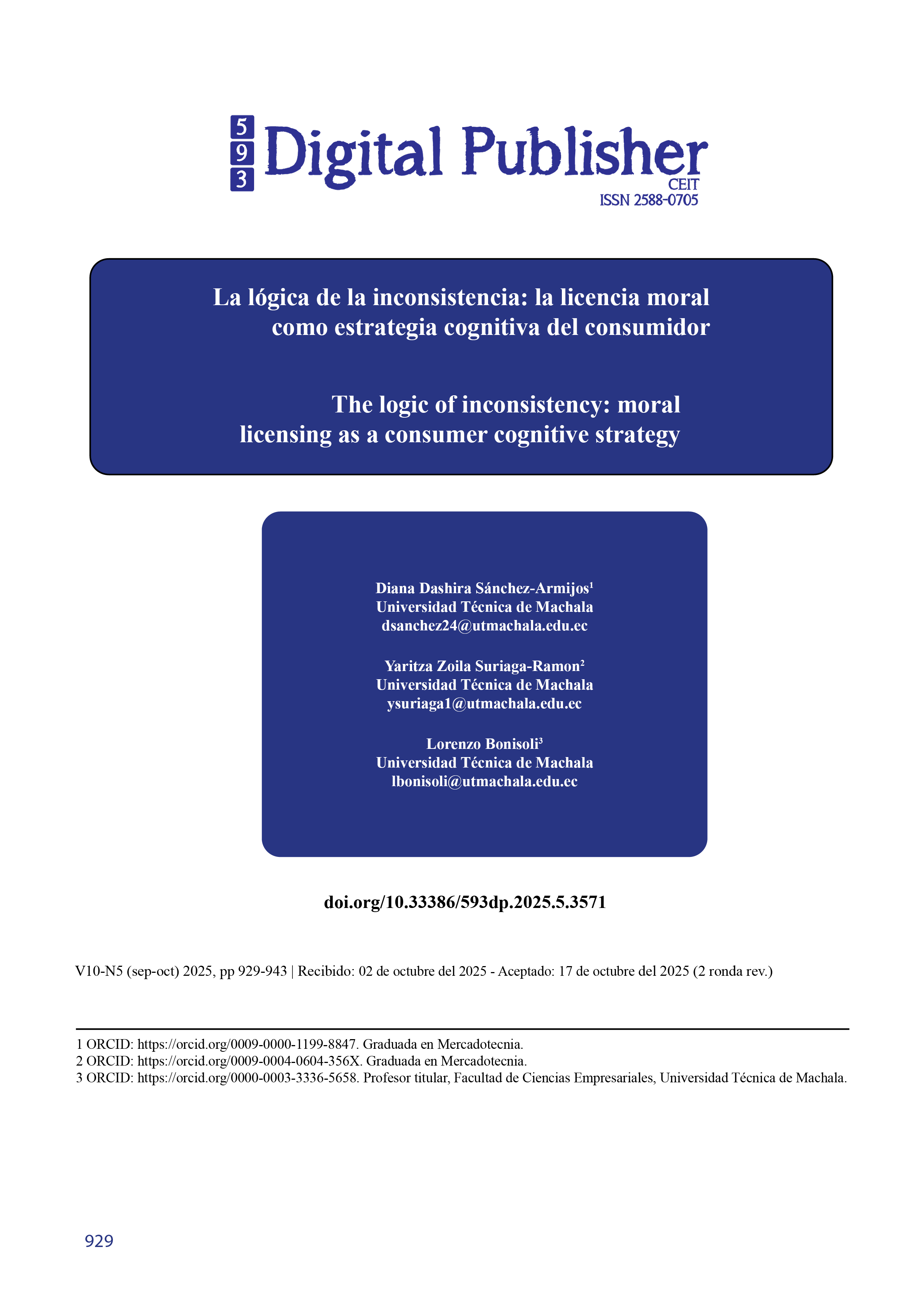The logic of inconsistency: moral licensing as a consumer cognitive strategy
Main Article Content
Abstract
Given the growing popularity of organic products, it is vital to understand what motivates people to choose them. This study presents a model that seeks to clarify how an individual's personal ethical code and previous habits interact with their internal justification for allowing themselves a reward, which ultimately shapes their purchasing decision. To achieve this, numerical research was conducted to collect data through surveys distributed via a network of contacts. Subsequently, advanced statistical analysis was applied to examine the connections between psychological variables. The main results indicate that a sense of personal duty is the most decisive factor in purchasing. However, the most striking finding is that the feeling of having accumulated “credit” for past actions does not encourage consistency but, on the contrary, intensifies the individual's internal debate, complicating their final choice. This work offers valuable information for those involved in commercial strategy, brand communication, and the design of public policies aimed at encouraging more conscious consumption.
Downloads
Article Details

This work is licensed under a Creative Commons Attribution-NonCommercial-ShareAlike 4.0 International License.
1. Derechos de autor
Las obras que se publican en 593 Digital Publisher CEIT están sujetas a los siguientes términos:
1.1. 593 Digital Publisher CEIT, conserva los derechos patrimoniales (copyright) de las obras publicadas, favorece y permite la reutilización de las mismas bajo la licencia Licencia Creative Commons 4.0 de Reconocimiento-NoComercial-CompartirIgual 4.0, por lo cual se pueden copiar, usar, difundir, transmitir y exponer públicamente, siempre que:
1.1.a. Se cite la autoría y fuente original de su publicación (revista, editorial, URL).
1.1.b. No se usen para fines comerciales u onerosos.
1.1.c. Se mencione la existencia y especificaciones de esta licencia de uso.
References
Acosta, M., López, M., & Coronel, V. (2018). Estrategias de Marketing para el mercado de productos orgánicos en el Ecuador. Revista Espacios 39(8), 24. https://www.revistaespacios.com/a18v39n08/18390824.html
Bauer, A., & Menrad, K. (2023). The nexus between moral licensing and behavioral consistency: Is organic consumption a door-opener for commitment to climate protection? The Social Science Journal, 60(4), 665–679. https://doi.org/10.1080/03623319.2020.1757350
Carmona, I., Griffith, D. M., & Aguirre, I. (2021). Understanding the factors limiting organic consumption: the effect of marketing channel on produce price, availability, and price fairness. Organic Agriculture, 11(1), 89–103. https://doi.org/10.1007/s13165-020-00331-1
Carrión-Bósquez, N. G., Ortiz-Regalado, O., Veas-González, I., Naranjo-Armijo, F. G., & Guerra-Regalado, W. F. (2025). The mediating role of attitude and environmental awareness in the influence of green advertising and eco-labels on green purchasing behaviors. Spanish Journal of Marketing - ESIC, 29(3), 330–350. https://doi.org/10.1108/SJME-08-2023-0217
Chen, C., Li, D., Qian, J., & Li, Z. (2024). The Impact of Green Purchase Intention on Compensatory Consumption: The Regulatory Role of Pro-Environmental Behavior. Sustainability (2071-1050), 16(18). https://doi.org/10.3390/su16188183
Diddi, S., & Niehm, L. S. (2017). Exploring the role of values and norms towards consumers’ intentions to patronize retail apparel brands engaged in corporate social responsibility (CSR). Fashion and Textiles, 4(1), 5. https://doi.org/10.1186/s40691-017-0086-0
Bianca do Prado, N., & Hermínio Salati Marcondes de Moraes, G. (2020). Environmental awareness, engaged consumption and organic products consumption. Revista Pensamento Contemporâneo em Administração, 14(2), 33-48. https://doi.org/10.12712/rpca.v14i2.42212
Dorce, L. C., da Silva, M. C., Mauad, J. R. C., de Faria Domingues, C. H., & Borges, J. A. R. (2021). Extending the theory of planned behavior to understand consumer purchase behavior for organic vegetables in Brazil: The role of perceived health benefits, perceived sustainability benefits and perceived price. Food Quality and Preference, 91,104191. https://doi.org/10.1016/j.foodqual.2021.104191
Dreijerink, L., Handgraaf, M., & Antonides, G. (2021). Rationalizing Inconsistent Consumer Behavior. Understanding Pathways That Lead to Negative Spillover of Pro-environmental Behaviors in Daily Life. Frontiers in Psychology, 12, 583596. https://doi.org/10.3389/fpsyg.2021.583596
Engel, J., & Szech, N. (2020). A little good is good enough: Ethical consumption, cheap excuses, and moral self-licensing. PloS one, 15(1), e0227036. https://doi.org/10.1371/journal.pone.0227036
Eunike, I. J., Silalahi, A. D. K., & Tedjakusuma, A. P. (2025). Towards a holistic model of green consumerism by integrating ethical obligations, collective efficacy, and environmental concerns in sustainable purchase behavior. Sustainable Futures, 100746. https://doi.org/10.1016/j.sftr.2025.100746
Gholamzadehmir, M., Sparks, P., & Farsides, T. (2019). Moral licensing, moral cleansing and pro-environmental behaviour: The moderating role of pro-environmental attitudes. Journal of Environmental Psychology, 65, 101334. https://doi.org/10.1016/j.jenvp.2019.101334
Hartmann, P., Marcos, A., & Barrutia, J. M. (2023). Carbon tax salience counteracts price effects through moral licensing. Global Environmental Change, 78, 102635. https://doi.org/10.1016/j.gloenvcha.2023.102635
Juvan, E., & Dolnicar, S. (2016). Measuring environmentally sustainable tourist behaviour. Annals of Tourism Research, 59, 30–44. https://doi.org/10.1016/j.annals.2016.03.006
Kruse, H. (2025). Nachhaltiger Lebensmittelkonsum – Erklärungsansätze für den Attitude-Behavior-Gap von Studierenden in Norddeutschland. Standort, 49(1), 3–12. https://doi.org/10.1007/s00548-024-00928-8
Lasarov, W., & Hoffmann, S. (2020). Social Moral Licensing. Journal of Business Ethics, 165(1), 45–66. https://doi.org/10.1007/s10551-018-4083-z
Bonisoli, L. (2025). Consideraciones profundas: vinculando normas personales con intenciones proambientales en el turismo centennial. Revista Geográfica Venezolana, 66(1), 31–47. https://doi.org/10.53766/RGV/
Lu, J., Liu, Y., Jing, Q., & Zhang, W. (2025). Chinese consumers’ perceptions, attitude, and purchase intention of organic products. Appetite, 108142. https://doi.org/10.1016/j.appet.2025.108142
McCarthy, B. (2024). Moral licensing and habits: Do solar households make negligent choices? Renewable and Sustainable Energy Reviews, 191, 114213. https://doi.org/10.1016/j.rser.2023.114213
Mirabella, C., Borsellino, V., Galati, A., Schimmenti, E., & Caracciolo, F. (2025). Value‐Belief and Value‐Identity Norms in Ethical Food Consumption: Investigating the Influence of Worker‐Friendly Labels in Italy. Corporate Social Responsibility and Environmental Management, 32(2), 2582–2597. https://doi.org/10.1002/csr.3081
Pérez, J. M., Núñez, J. B. A., & Pérez, S. M. (2021). Intención de compra de productos verdes de acuerdo con la Teoría del Comportamiento Planeado: Incorporación de la obligación moral al modelo. Revista Academia & Negocios, 7(1), 15–30. https://doi.org/10.29393/RAN6-2ICJM30002
Murti, N. M. D. A., & Ekawati, A. D. (2022). Factors Affecting Millennials Purchase Intention and Sustainable Consumption of Organic Food. Jurnal Optimasi Sistem Industri, 21(2), 106-114. https://doi.org/10.25077/josi.v21.n2.p106-114.2022
Nascimento, J., & Loureiro, S. M. C. (2024). The PSICHE framework for sustainable consumption and future research directions. EuroMed Journal of Business, 19(3), 571–611. https://doi.org/10.1108/EMJB-12-2021-0199
Ringle, C. M., Wende, Sven., & Becker, J.-Michael. (2024). SmartPLS 4. Recuperado de https://www.smartpls.com
Sharifi, R., Kheiri, B., & Rahmati, Y. (2021). A Behavioral Model for Buyers of Organic Products (Components, Antecedents and Consequences). Environmental Energy and Economic Research, 5(1), 1-17. https://doi.org/10.22097/eeer.2020.246921.1169
Siew, E. G., Yeow, P. H. P., Yen, Y. Y., & Loo, W. H. (2025). Comparing the antecedents of green computer behavior at acquisition, use, and disposal consumption stages from the moral norm and consumer attributes perspectives. PloS One, 20(6), e0323622. https://doi.org/10.1371/journal.pone.0323622
Simbrunner, P., & Schlegelmilch, B. B. (2017). Moral licensing: a culture-moderated meta-analysis. Management Review Quarterly, 67(4), 201–225. https://doi.org/10.1007/s11301-017-0128-0
Straughan, R. D., & Roberts, J. A. (1999). Environmental segmentation alternatives: A look at green consumer behavior in the new millennium. Journal of Consumer Marketing, 16(6), 558–575. https://doi.org/10.1108/07363769910297506
Tandon, A., Dhir, A., Kaur, P., Kushwah, S., & Salo, J. (2020). Why do people buy organic food? The moderating role of environmental concerns and trust. Journal of Retailing and Consumer Services, 57, 102247. https://doi.org/10.1016/j.jretconser.2020.102247
Wang, S., Fan, J., Zhao, D., Yang, S., & Fu, Y. (2016). Predicting consumers’ intention to adopt hybrid electric vehicles: using an extended version of the theory of planned behavior model. Transportation, 43(1), 123–143. https://doi.org/10.1007/s11116-014-9567-9
Wu, J., Ahmad, S. F., Jaweria, N., Ali, Y. A., Al-Razgan, M., Awwad, E. M., & Ayassrah, A. y B. A. (2024). Investigating the role of green behavior and perceived benefits in shaping green car buying behavior with environmental awareness as a moderator. Heliyon, 10(9), e30098. https://doi.org/10.1016/j.heliyon.2024.e30098
Wu, R., & Clark, L. (2024). Impulse and reason? Justifications in problem gambling. Addictive Behaviors, 157, 108072. https://doi.org/10.1016/j.addbeh.2024.108072
Xu, F., Huang, L., & Whitmarsh, L. (2020). Home and away: cross-contextual consistency in tourists’ pro-environmental behavior. Journal of Sustainable Tourism, 28(10), 1443–1459. https://doi.org/10.1080/09669582.2020.1741596
Yadav, R., & Pathak, G. S. (2016). Intention to purchase organic food among young consumers: Evidences from a developing nation. Appetite, 96, 122–128. https://doi.org/10.1016/j.appet.2015.09.017




